b. July 30th, 1940 in Lambert (Mississippi)
d. March 14th, 2011 in Memphis (Tennessee)
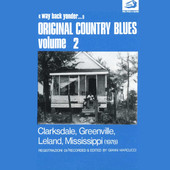
ORIGINAL COUNTRY BLUES vol.2
Albatros
August 1978
Une sympathique version de "Catfish blues" captée à Clarksdale dans cette anthologie conçue par l'italien Gianni Marcucci.
A nice version of "Catfish blues" captured in Clarksdale in this anthology supervised by italian Gianni Marcucci.
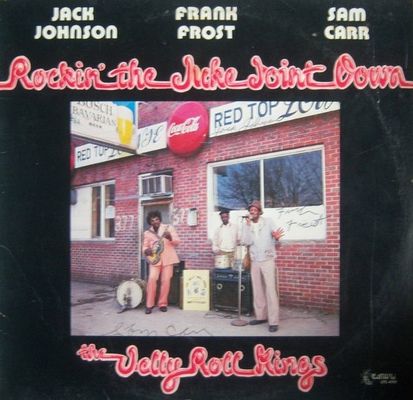
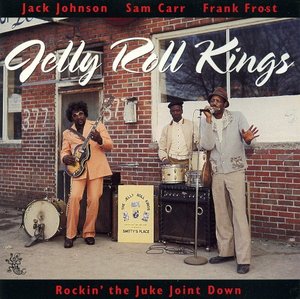
ROCKIN' THE JUKE-JOINT DOWN
Earwig
November 1978
Redécouvert en 1975 par Michael Frank, Frank Frost trouve l'opportunité de graver un nouvel album un peu plus tard pour Earwig (un label que Michael Frank vient de créer) avec ses compères (sous le nom de Jelly Roll Kings). On retrouve donc le trio original constitué de Frank Frost (voix, harmonica, orgue, piano), Big Jack Johnson (voix, guitare) et Sam Carr (batterie). Ils délivrent la même musique percutante constamment excitante qui est leur marque de fabrique : "Road of love", "Mighty long time", "Honeydrippin' boogie", "Cleo's back", "Have mercy baby", "Burnt biscuits". Du blues brut et sans fioriture qui donne l'envie irrépressible de danser.
Rediscovered in 1975 by Michael Frank, Frank Frost finds the opportunity to cut a new album later for Earwig (a label that Michael Frank has just created) with his friends (as the Jelly Roll Kings). We thus find the original trio of Frank Frost (voice, harmonica, organ, piano), Big Jack Johnson (vocals, guitar) and Sam Carr (drums). They deliver the same consistently exciting forceful music that is their trademark "Road of love", "Mighty long time", "Honeydrippin' boogie", "Cleo's back", "Have mercy baby", "Burnt cookies". Raw blues that gives the irrepressible desire to dance.
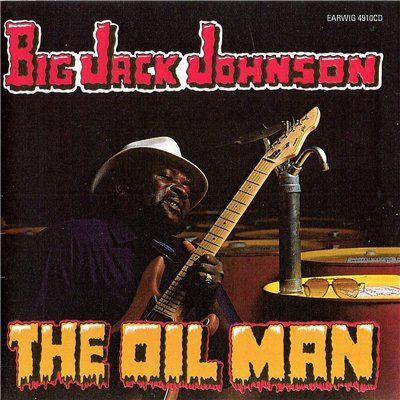
THE OIL MAN
Earwig
June 1986
Influencé par son père Ellis Johnson, lui-même bluesman local, Jack apprend la guitare dès son enfance. A Clarksdale, il s'associe avec les bluesmen Frank Frost (harmonica) et Sam Carr (batterie) pour former un trio très efficace : The Nighthawks (une formation qui accompagne Robert Nighthawk). Ils enregistrent d'abord avec Frost comme leader en 1962 puis, dans les années 70, sous le nom de Jelly Roll Kings. Le groupe mènera une existence plus ou moins régulière dans les juke-joints de la région jusqu'au milieu des années 80. Jack démarre, alors, une carrière en solitaire. Dans la lignée de ce qu'il faisait avec les Jelly Roll Kings, il s'illustre dans un blues éléctrique, rural et terrien dans la tradition du Delta : guitare rageuse et tranchante, voix puissante parfois erraillée qui évoque Howlin' Wolf, une de ses influences majeures. Le titre de son premier album fait référence à son métier de camionneur pour une compagnie pétrolière. Parfaitement accompagné par Frank Frost (piano) et les frères Ernest & Walter Roy (basse et batterie), Jack propose une version magistrale de "Catfish blues" et quelques remarquables compositions personnelles en particulier l'évocateur et puissant "I'm gonna gave up disco and go back to the blues".
Influenced by his father Ellis Johnson, himself a local bluesman, Jack learned the guitar from childhood. In Clarksdale, he joined with bluesmen Frank Frost (harmonica) and Sam Carr (drums) to form a powerful trio : The Nighthawks (a band that accompanies Robert Nighthawk). They recorded first with Frost as leader in 1962 and then, in the 70's, as the Jelly Roll Kings. The band lead a more or less regular existence in juke joints until the mid-80's. Jack starts, then a solo career. In line with what he was doing with the Jelly Roll Kings, he distinguished himself in an electric rural down-home blues in the Delta : sharp guitar, powerful voice sometimes raucous which recalls Howlin' Wolf, one of his major influences. The title of his first album refers to his job as a truck driver for an oil company. Perfectly accompanied by Frank Frost (piano) and brothers Ernest & Walter Roy (bass and drums), Jack offers a masterful version of "Catfish blues" and some outstanding personal compositions particularly the evocative and powerful "I'm gonna gave up disco and go back to the blues".
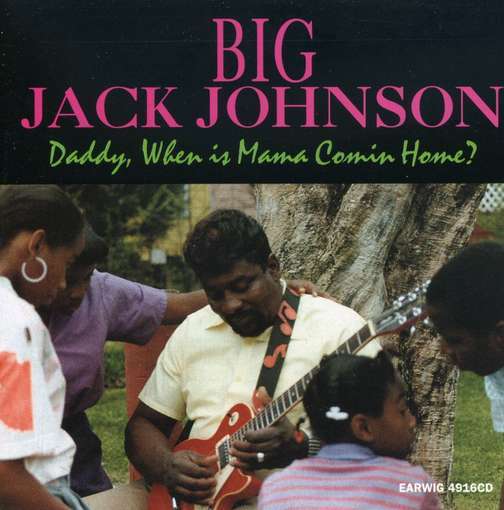
DADDY WHEN IS MAMA COMIN' HOME
Earwig
Blue Sting
February 1988 / September 1989
Pour ce second album, Big Jack Johnson a opté pour une formule complètement différente que pour son premier opus. Effectivement, "The oil man" faisait la part belle aux reprises tandis que celui-ci est rempli de ses propres compositions abordant, d'ailleurs, des thèmes inhabituels comme le sida, les violences conjugales ou les conséquences de la crise économique. D'autre part, les arrangements sont, ici, plus élaborés que le disque précédent avec notamment l'ajout d'une section cuivres (overdubs). Gravé lors de deux sessions distinctes avec des musiciens expérimentés comme John Primer, Larry & Aron Burton, Bill Mac Farland, il s'agit de son second disque pour Earwig, le label de Michael Frank. Un disque créatif, ambitieux et atypique qui vaut largement l'écoute. Une petite réserve : quelques morceaux semblent un peu longs et auraient mérités d'être raccourcis.
For this second album, Big Jack Johnson opted for a completely different formula than for his first one. Indeed, "The oil man" was heavily loaded with standard covers while this one is filled with his own compositions dealing with unusual topics such as aids, domestic violence or economic crisis consequences. Furthermore, arrangements are more elaborate here than on the previous record especially with the addition of a horn section (overdubs). Recorded in two separate sessions with experienced musicians such as John Primer, Larry & Aron Burton, Bill McFarland, this is his second album for Earwig, Michael Frank's label. A creative, ambitious and unusual album that is well worth listening. A small reserve : some tracks seem a bit long and had deserved to be shortened.
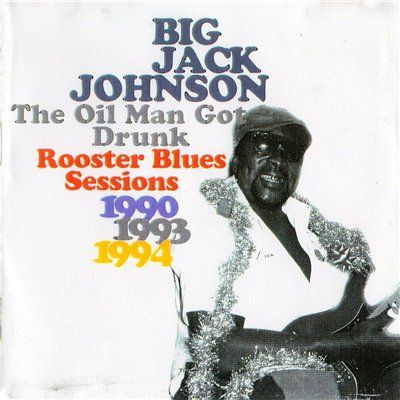
THE OIL MAN GOT DRUNK : ROOSTER BLUES SESSIONS
P-Vine
January 1990 - September 1993
Ce disque regroupe plusieurs séances initialement prévues pour Rooster mais finalement publiées intégralement par le label japonais P-Vine (Rooster a publié quelques titres sur une cassette et un 45 tours). Produites par Jim O'Neal, elles rassemblent Jack et quelques amis bluesmen comme Terry Williams, Frank Frost, Lonnie Pitchford, Sam Carr, Super Chikan (le neveu de Jack). On trouve quelques belles réussites dans son style caractéristique de Delta blues brut et rugueux : "Rudolph got drunk last night", "Ice storm blues" ou "Vampire woman".
This disc includes several sessions originally foresaw for Rooster but finally fully published by the Japanese label P-Vine (Rooster has released some tracks on a cassette and a 45). Produced by Jim O'Neal, they bring together Jack and some bluesmen friends like Terry Williams, Frank Frost, Lonnie Pitchford, Sam Carr, Super Chikan (Jack's nephew). We find several great tracks in his characteristic raw and rough style of Delta blues : "Rudolph got drunk last night", "Ice storm blues" or "Vampire woman".
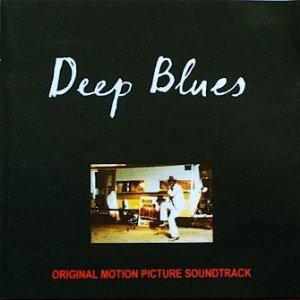
DEEP BLUES
Atlantic
October 1991
Ce disque est la bande-son du film documentaire réalisé par Robert Mugge, produit par Dave Stewart et écrit par Robert Palmer. Il y a trois titres gravés en public dans un club de Clarksdale interprétés par Big Jack Johnson. Trois superbes interprétations puissantes et stimulantes typiques du blues des juke-joints.
This album is the original soundtrack of the documentary film directed by Robert Mugge, produced by Dave Stewart and written by Robert Palmer. There are three tracks recorded live in a Clarksdale club performed by Big Jack Johnson. Three superb powerful and exciting renditions of typical juke joint blues.
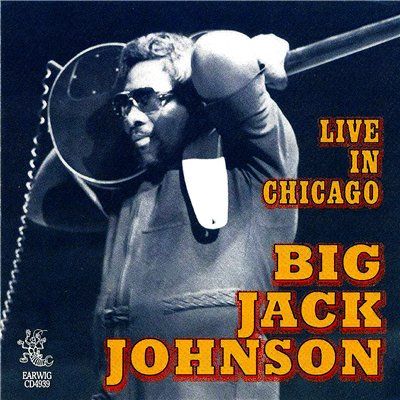
LIVE IN CHICAGO
Earwig
June 1994 / March 1995
Dans ce dernier album pour Earwig sont recueillis deux concerts chicagoans captés en 1994 et 1995 (sur les scènes du Hothouse et du Buddy Guy's Legends). Son orchestre, pour les deux concerts, est constitué de musiciens aguerris (Lester Davenport, Allen Batts, Aron Burton, Kenny Smith). Malgré cela, le contenu du disque bien que plaisant manque parfois un peu d'inspiration et d'originalité. Un album intéressant mais mineur dans la discographie de ce bluesman.
In this album for Earwig are collected two chicagoans concerts recorded in 1994 and 1995 (on Hothouse and Buddy Guy's Legends stages). His orchestra, for both concerts, consists of experienced musicians (Lester Davenport, Allen Batts, Aron Burton, Kenny Smith). Despite this, this album often pleasant sometimes lacks inspiration and originality. An interesting but minor album in the bluesman discography.
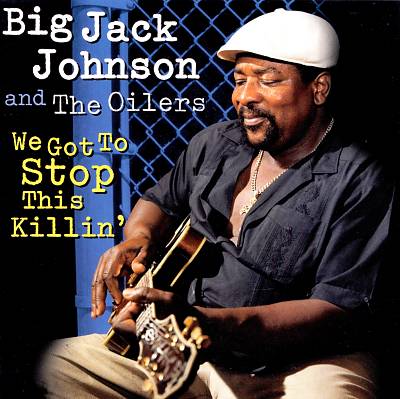
WE GOT TO STOP THIS KILLIN'
M.C.
February 1996
Premier de ses quatres disques pour M.C., le label fondé par Mark Carpentieri. Jack y confirme ses réels talents de compositeur. Inspiré, varié et bien produit, il s'agit certainement d'un de ses meilleurs albums. Son Delta blues âpre et rugueux est parfaitement en place. On remarque notamment sa slide guitare tranchante dans "Hummin' blues" et "It's the fourth of july" mais aussi le furieux "Breakdown blues" et l'instrumental "Cracklin' bread".
First of four albums for M.C., the label founded by Mark Carpentieri. Jack confirms his real skills as a composer. Inspired, varied and well produced, it is certainly one of his best CD. His harsh and rough Delta blues is perfectly in place. We note in particular the sharp slide guitar in "Hummin' blues" and "It's the fourth of july" but also in the furious "Breakdown blues" and the instrumental "Cracklin' bread".
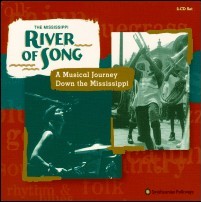
THE MISSISSIPPI RIVER OF SONG
Smithsonian-Folkways
April 1996
On trouve deux reprises de standards du blues interprétées par Jack : une version acoustique de "Catfish" et "Shake your moneymaker" ou il retrouve ses vieux complices des Jelly Roll Kings (Frank Frost, Sam Carr accompagnés du bassiste David Porter).
Two blues standards covers interpreted by Jack : an acoustic version of "Catfish" and "Shake your moneymaker" where he meets again his old Jelly Roll Kings friends (Frank Frost, Sam Carr accompanied by bassist David Porter).
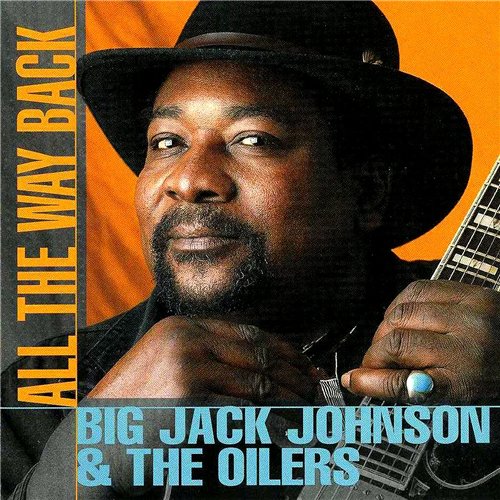
ALL THE WAY BACK
M.C.
March - September 1997
Réalisé avec la même équipe que le précédent album : Mark Carpentieri à la production, enregistrement au Tiki Studio de Glen Cove, Chet Woodward à la batterie et Maury "Hooter" Sasloff à la basse. On note, en plus, une participation aux claviers de "Little" Anthony Geraci. Quelques superbes moments émaillent ce disque : "Crack headed woman", "Miss Magalee Hall" et une version soul-funk de "Shake your bootie".
Made with the same team as the previous album : Mark Carpentieri as producer, recording at Glen Cove's Tiki Studio, Chet Woodward on drums and Maury "Hooter" Sasloff on bass. We note, in addition, a participation of keyboardist "Little" Anthony Geraci. Some great moments punctuate this disc : "Crack headed woman", "Miss Magalee Hall" and a soul-funk version of "Shake your bootie".
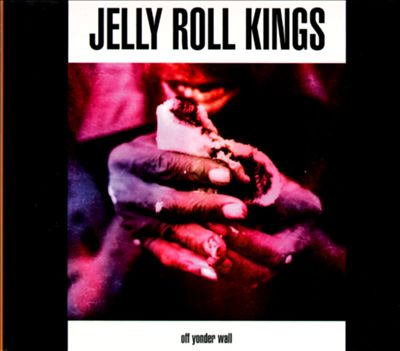
OFF YONDER WALL
Fat Possum
1997
Bien que le livret indique Frank Frost à l'harmonica, il n'en joue pas, se concentrant uniquement sur les claviers. Comme dans "Rockin' the juke-joint down", les Jelly Roll Kings jouent un concentré de down-home blues : une guitare incisive parfaitement soutenue par orgues et claviers swinguants et une batterie souple et dynamique. "Frank Frost blues", "That's alright mama", "Have mercy baby" sont particulièrement puissants. Ces sessions furent produites par Robert Palmer en 1997 et publiées par Fat Possum.
Although the booklet indicates Frank Frost on harmonica, he does not play this instrument focusing only on keyboards. As in "Rockin' the juke joint-down", The Jelly Roll Kings play a concentrate of down-home blues : an aggressive guitar perfectly supported by swinging organs and keyboards and a dynamic and flexible drums. "Frank Frost blues", "That's alright mama", "Have mercy baby" are particularly powerful. These sessions were produced by Robert Palmer in 1997 and issued by Fat Possum.
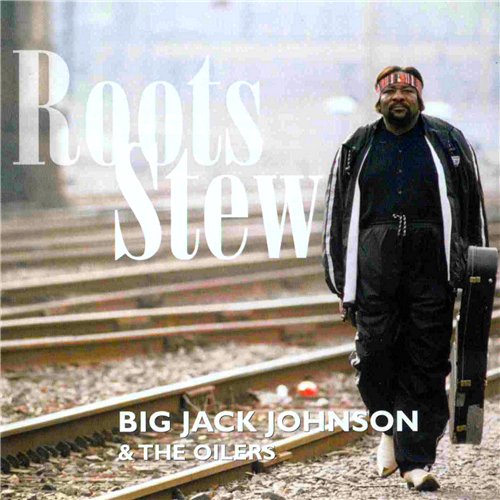
ROOTS STEW
M.C.
October 1998 - 1999
Big Jack délivre une fois de plus un concentré de blues brut et terrien dans ce disque. Bien épaulé par un groupe homogène (Chris Dean, Maury "Hooter" Saslaff, Dale Wise), il brille sur "Jump for joy", "Hummingbird", "Too many rats", l'acoustique "I wanna go home" (avec l'harmonica de "Wild Child" Butler). Il joue de la mandoline sur quelques morceaux, en particulier sur l'excellent "Cherry tree".
Big Jack once again delivers a concentrate of raw and down-home blues in this record. Well supported by a homogeneous backing band (Chris Dean, Maury "Hooter" Saslaff, Dale Wise), he shines on "Jump for joy", "Hummingbird", "Too many rats", the acoustic "I wanna go home" (with the harmonica of "Wild Child" Butler). He plays mandolin on a few tracks, especially on the excellent "Cherry tree".
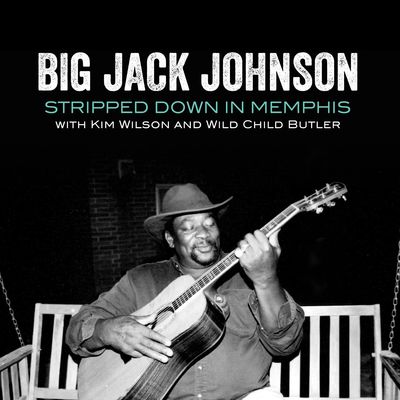
STRIPPED DOWN IN MEMPHIS
M.C.
October 1998 / October 2000
Ce disque posthume (édité en 2022) proposé par Mark Carpentieri rassemble de formidables faces acoustiques enregistrées en 1998 et 2000 qui ne furent jamais éditées. Sur celles-ci, Jack en pleine forme est accompagné des harmonicistes "Wild Child" Butler et Kim Wilson et délivre un blues terrien inspiré et percutant : "Baby what you want me to do", "The hucklebuck", le superbe "Alcohol", "See me coming", "The hully gully twist".
This posthumous album (issued in 2022) proposed by Mark Carpentieri brings together formidable acoustic sides recorded in 1998 and 2000 which were never issued. On these, Jack in full form is accompanied by harmonicists "Wild Child" Butler and Kim Wilson and delivers an inspired and percussive down-home blues : "Baby what you want me to do", "The hucklebuck", the superb "Alcohol", "See me coming", "The hully gully twist".
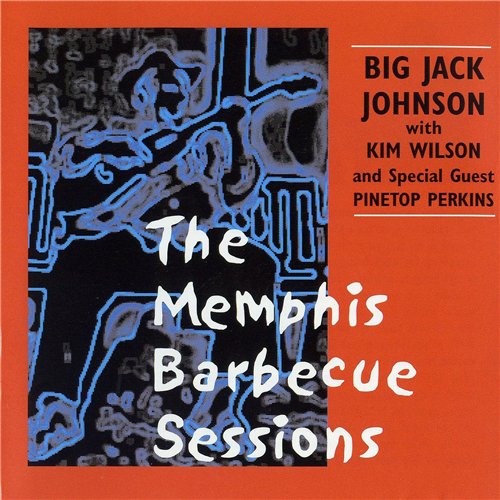
THE MEMPHIS BARBECUE SESSIONS
M.C.
October 2000
En septembre 2000, le producteur Mark Carpentieri propose à Big Jack Johnson de réaliser un album acoustique. Il l'associe, alors, avec l'harmoniciste Kim Wilson. Enregistré à Memphis, comme le titre le suggère, il en résulte un disque inégal mais plutôt intéressant, le dernier pour M.C. On retrouve, ici, moins de compositions personnelles de Big Jack qu'à l'accoutumée et plus de reprises de standards ("Smokestack lightning" et "My babe" parmi les meilleurs).
In september 2000, producer Mark Carpentieri offers Big Jack Johnson to record an acoustic album. Then, he associates Big Jack with harpist Kim Wilson. Cut in Memphis, as the title suggests, the result is an uneven but interesting CD, the last for M.C. We can find here less Big Jack's personal compositions than usual and more standard covers ("Smokestack lightning" and "My babe" among the best).

JUKE JOINT SATURDAY NIGHT
Right Coast
March 2008
Après un long moment d'absence, Big Jack Johnson a formé un nouveau groupe, les Cornlickers (Bobby Gentilo également producteur, Dave Groninger, Tony Ryder, Lee Carroll, Dale Wise). Il revient avec ce disque de Delta blues électrique dans la grande tradition du genre avec des guitares parfois un peu trop présentes (il y a trois guitaristes dans le studio) ce qui rend le son un peu confus et monolithique. Beaucoup moins inspiré qu'à l'habitude, Big Jack Johnson livre, sans doute, ici, son album le plus faible.
After a long absence, Big Jack Johnson launched a new band, the Cornlickers (Bobby Gentilo also producer, Dave Groninger, Tony Ryder, Lee Carroll, Dale Wise). He returns with this traditional Delta electric blues album with sometimes too present guitars (there are three guitarists in the studio), which makes a bit confusing and monolithic sound. Much less inspired than usual, Big Jack Johnson delivers probably his weakest album.

KATRINA
Big Jack Music
2008
Jack est désormais produit par Bobby Gentilo et Dale Wise pour le compte de son propre label Big Jack Music. Cet album manifestement très personnel (orné d'une superbe pochette) est dédié à la terre, le peuple et l'esprit du Mississippi. Il retrouve ici le meilleur de son inspiration notamment dans les blues profonds et émotionnels que sont "Katrina" (à propos de l'ouragan du même nom), "It's all gone" et "The cryin' blues" (un morceau franchement étonnant). On retient également les excitants "Stop pushin' on me", "Ain't gonna do it no more" et, enfin, "Po' cow boogie" ou Jack joue de la mandoline. Un disque remarquable, probablement un de ses meilleurs, qu'il convient d'avoir dans sa propre collection.
Jack is now produced by Bobby Gentilo and Dale Wise on behalf of his own label Big Jack Music. This album, clearly very personal (adorned with a superb cover), is dedicated to the land, the people and the spirit of Mississippi. He finds again the best of its inspiration especially in deep and emotional blues that are "Katrina" (about the hurricane of the same name), "It's all gone" and "The cryin' blues" (an astonishing track). We also retain the exciting "Stop pushin' on me", "Ain't gonna do it no more" and, finally, "Po' cow boogie" where Jack plays mandolin. A remarkable record, probably one of his best, that is appropriate to have in his own blues collection.

BIG JACK'S WAY
Big Jack Music
February 2010
Il s'agit d'un album posthume puisqu'il est paru en 2012 (Big Jack Johnson est décédé en mars 2011). On y retrouve les derniers morceaux enregistrés du bluesman environ un an avant sa disparition. Sa famille y a ajouté un sympathique mini album-photo dans le livret ou on le retrouve sur scène, en répétition, avec sa famille ou ses proches. Musicalement, les morceaux présentés n'apportent pas grand chose à son oeuvre même s'ils méritent l'écoute. Il faut davantage conseiller cet album aux fans confirmés de Big Jack.
This is a posthumous album since it came out in 2012 (Big Jack Johnson died in march 2011). It contains the latest tracks recorded by the bluesman about a year before his death. His family has added nice pictures in the booklet where we can find him on stage, in rehearsal, or with his family or his relatives. Musically, presented songs do not add much to his work even if they are worth listening. We need more recommend this album to Big Jack's confirmed fans.